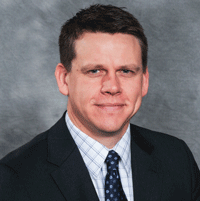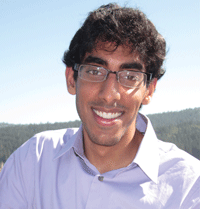What I Know Now That I Wish I Knew Then
From the EMRA Medical Student Council
Introduction
Welcome back to part two of our MSC's reflections on matching, the interview process, and settling down for residency. This issue focuses more on interviews, and we hope will be of benefit for all of the advancing medical students. We hope that you enjoyed the last article (missed it? visit emresident.org), and hope that you are able to glean important information from this issue's installment, as well. EMRA wishes you the best in your away rotations, interview process, and next career steps. Here's to the countdown!
David Reid, DO
Kansas City University of Medicine & BioSciences
Past Medical Student Council Chair
Matched: University of Texas Southwestern Medical Center
Dallas, TX
I remember looking at VSAS last year and feeling overwhelmed at the number of different away rotation possibilities. I am graduating from a DO school without a home EM program, so I felt like I was starting off at a disadvantage – which was true in many ways; but in others it was not. I don't remember my exact method of applying to and scheduling VSAS rotations, but I'm sure the things I learned while on my “aways” would have definitely redirected my VSAS efforts.
You have to recognize that there are several potential benefits of each away rotation experience you have – as well as a few dangers to consider. Don't fall into the trap of thinking, “I'm not competitive enough for that place,” or even, “That would just be a backup for me.” When it comes to programs offering spots to students, there are no uniform policies or rules. You'll be surprised by the opportunities you do and don't get! I'm not saying you should apply everywhere on VSAS, but definitely give yourself as wide a range of locations and dates as possible. Even though you may not get exactly what you hoped, what you really don't want is to panic in October when you only have one SLOE (standardized letter of evaluation) with no more away rotations lined up because of poor planning in the spring.
And speaking of SLOEs”¦they are the prize at the end of every great away rotation. Unfortunately, it's also a potential let-down you get at the end of a bad rotation. What I didn't understand fully a year ago was that it's almost automatic for every EM clerkship to provide all MSIVs with a SLOE — good or bad. It's not like a traditional letter of recommendation that you have to ask for from a mentoring attending. There are variations in the policy from place to place, but most places asked me where to send my SLOE before I asked them to write one! So you should expect to get one everywhere you rotate, good or bad. Expect to be questioned during interviews if you have an away rotation on your transcript but no SLOE for them to review.
The bottom line of what I learned on away rotations is to be energetic, available, and likeable. Schedule more than three and you may be setting yourself up for exhaustion and burnout. It's hard work to put on your best show every shift for months. Interviewers want to see growth and improvement, so if you get an honors grade in August at St. Elsewhere, followed by a simple passing grade in September at County General, be prepared for more questions.
Understanding how competitive you are can be critical to building a winning match strategy. You can apply to 40 places, but if they're the 40 that get the most applications per spot, you could be in some trouble. An average EM applicant might look like a standout for some other specialties, so it's important to understand how programs will see you when all they have is your application. The NRMP (see http://www.nrmp.org/match-data/main-residency-match-data) provides detailed match data from previous years, and if you take the time to go over everything in the EM sections, you will be more successful in getting interviews no matter what your status.
The first few weeks of interview season can be a stressful time. Most programs start looking at applications right away — so have it ready when the ERAS submission period opens in September. Then get ready for a frustrating waiting game as you may not hear from anyone for more than a month. My first interviews didn't begin until late October, and I received offers well into January. EM has traditionally provided later interviews to applicants compared to other specialties. (Insider's tip: working the room during the EMRA Residency Fair in October was very beneficial”¦ book your trip to Boston now!)
In those first few weeks, your mind can play some mean tricks on you, and at times I was pretty discouraged. I heard contacting programs directly could be seen as overbearing. But after many conversations with program faculty, I know now that this is mostly untrue. Reaching out politely and briefly to contact programs that you are especially interested in can be a great thing to do. But you have to recognize there can be a fine line between showing interest and being too aggressive. Also, never lie to a program about your special interests – word travels easily within the EM community. Program coordinators are a good gateway to communication with a program, and they often have a lot of input as to who makes it out of the application pool and who doesn't.
The entire interview process is a fluid period for all applicants and programs, and the later in the season, the more fluid it gets. Each cancellation sets off a chain reaction, and cancellations happen ALL the time. In fact it is such a common thing that programs are typically very gracious and understanding when you cancel appropriately. But canceling too late, or even worse – no-showing – can get really ugly. Programs have been known to contact schools, SLOE writers, and other programs to let them know an applicant didn't show up and essentially wasted the opportunity for them and for another qualified student. Consider yourself warned, and don't let this happen to you.
Hashim Zaidi, MD
Baylor College of Medicine
Past MSC Vice Chair
Matched: Northwestern University
Chicago, IL
The interview trail was an incredible journey. Looking back, I wish I knew the goal of the process really boils down to finding a program that fits for you – and only you (no matter what your friends feel). I was given that advice going into it, but didn't give it much thought. What I found by the end was that many of the places I was going to writeoff turned out to be some of my top choices. The reasons were many, including being surprised at what I found, who I connected with on interview day, or me not being sure exactly what I wanted from a program.
I entered the interview process with certain criteria in mind for an emergency medicine training program. Like most other academically-driven and ambitious people you find in this field, mine were mostly clinical criteria like volume, or clinical exposure, or something boring like that. At the end of the day, however, the programs that attracted me the most were the ones filled with intangible processes I couldn't number or label. These were things like a funny feeling I got when talking with faculty about passionate ideas on medicine and life. Or even non-medical things like how that city's streets seemed alive at night with excitement and promise. Call me a romantic, but at the end of the day it was my gut that told me the programs I loved. On paper the programs I was supposed to fall in love with fell short in these abstract concepts and subsequently didn't capture my affections.
Keep an open mind when applying and trust your instincts. Don't listen to what others like or dislike – remember everyone has their own fit. Interviews are a growing process for the applicant, and can be a wonderful introspective experience if you let it. It forces you to question your goals, your dreams, and even your patience with airport security. The match process really does work in the applicant's favor if you just go with it (you know, if ERAS works right and allows you to submit”¦). All of the programs are amazing and never once did I regret interviewing anywhere. At times it will feel a lot like dating, and much like dating, you'll know you've arrived at the right place when you get there.





